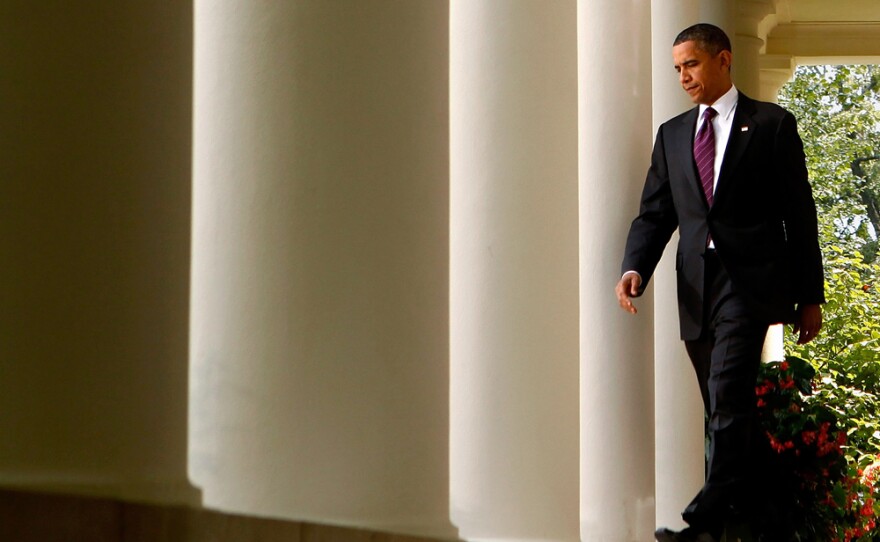Vanity Fair writer Todd Purdum recently spent a day in the White House following President Obama and his aides around. What he discovered, he says, is that Obama's job "would be almost unrecognizable to most of his predecessors -- thanks to the enormous bureaucracy, congressional paralysis, systematic corruption and disintegrating media" in Washington, D.C.
Purdum joins Fresh Air's Dave Davies for a conversation about the nature of the presidency -- and how difficult it is to achieve much of anything amid bloat, corruption and the 24-hour news cycle -- which, he writes, is "the most hyperkinetic, souped-up, tricked-out, trivialized and combative media environment any president has ever experienced."
"Obama makes fun of this all of the time, as he did at the White House correspondent dinner this spring when he had a PowerPoint presentation with some slides of what Politico would have made of President Lincoln," Purdum says. "And for the Civil War, there was a fake headline that said, 'Saves the Union, But Can He Save the House Majority?' It's funny, but it's also kind of sad because there is a way in which I think so many of our past presidents -- including many of the greatest ones -- could not have done what they did, at least not as easily, if they were operating in this media environment."
Purdum says he thinks Obama has tried to rise above the constant infighting that has taken over the federal government and keep his eye on the long road ahead.
"He's been remarkably consistent in doing what he said he was going to do when he took office. He's pursued education reform, he finally passed Wall Street regulatory reform, he got the health care bill passed, he passed the stimulus," Purdum says. "So I think he is content. He radiates a kind of satisfaction with what he's done, and the question is whether he can sell that to the American public and people will agree that he's accomplished what he said he was going to accomplish. His problem is that he's operating at a time where there's just no trust in institutions. ... He's put himself and his administration behind the idea of an activist, engaged government at a time when people don't particularly trust government. So that's a hard sell for him."
Purdum, the national editor for Vanity Fair, previously spent 23 years at The New York Times, where he was a diplomatic and White House correspondent in the paper's Washington bureau.
Interview Highlights
On what happens during the president's daily meeting with White House Chief of Staff Rahm Emanuel
"Rahm explained to me that he has a quick little briefing of the president: three, four, five minutes, whatever it takes, to sum up what's on the agenda for the day. And of course, the gulf between three, four, five minutes to sum up the entire world is pretty hilarious, but it's only the first take of the day, and then there's a series of other meetings that go on. And I think Rahm's mission is to focus on anything coming up that may be troublesome. ... It's an early warning system where [Rahm] talks about what's going to be on the radar that day."
On how Congress is different today than in past sessions
"Several things are strikingly different. Fifty years ago or so, Congress met for six to nine months a year, and when it was in session, it met mostly five days a week. Most members brought their families to live in the Washington area, and their kids went to school here and they knew each other and socialized with each other on the weekends. Quite frequently members drove home to their districts together at the end of the session to save money in a carpool. There was also no air conditioning, so people weren't holed up in their individual offices the way they are now. That really began to change in the 1970s and then accelerated in the 1980s and 1990s. And when Newt Gingrich became speaker of the House in 1995, he urged members to keep their families back so they would have to go home every weekend if possible. That's a necessity for campaigning and fundraising. But it has the effect of meaning members don't really know each other. They haven't spoken to each other in human ways. So it's a lot easier to be nasty and say nasty things about someone you don't know than to say nasty things about someone who you go to church with or see in the supermarket."
On the White House daily press briefing
"If what the congressional leaders do is Kabuki theater, then what the press do is really comic theater. ... It just seems so impossible to have a real discussion about anything because there's just so much posturing going on, on the part of both the press secretary, Robert Gibbs, and the press. But it's a terrible vehicle for the real exchange of information. The television reporters each ask two to three questions each, they don't move beyond the first or second row of the briefing room -- which is why everyone fights for seats in the first or second row. ... It's kind of a profoundly silly exercise, but there seems no way to stop it. It's so ingrained and it's so traditional that it seems there'd be hell to pay for any administration who tried to stop it."
Copyright 2022 Fresh Air. To see more, visit Fresh Air. 9(MDAzMjM2NDYzMDEyMzc1Njk5NjAxNzY3OQ001))





